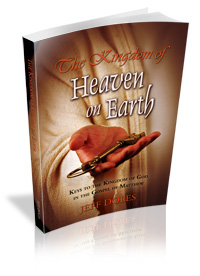And when Jesus saw great multitudes about Him, He gave a command to depart to the other side. Then a certain scribe came and said to Him, “Teacher, I will follow You wherever You go.” And Jesus said to him, “Foxes have holes and birds of the air have nests, but the Son of Man has nowhere to lay His head.”
Then another of His disciples said to Him, “Lord, let me first go and bury my father.” But Jesus said to him, “Follow Me, and let the dead bury their own dead.” (Matthew 8:18-22)
As Jesus passed on from there, He saw a man named Matthew sitting at the tax office. And He said to him “Follow Me.” So he arose and followed Him. (Matthew 9:9)
What does it mean to follow the King? Matthew gives us three vignettes. The first is about a scribe, a teacher of the law quite taken with Jesus and His message. He said, “Teacher, I will follow You wherever you go.” There is no reason to doubt that he meant it, as least as much as he understood it. But did he really know what he was asking? Jesus laid it out for him: “The Son of Man has nowhere to lay His head.” He was not speaking of a life of poverty, but a life lived on a different basis. Follow Jesus and there is no telling where you might end up. Where He was heading, there was also a lot of persecution for Him and his disciples to endure (see Matthew 10:16-26). To follow Jesus is to step away from the security offered by the world and live in full dependence on Him.
The second brief story is about “another of His disciples,” which seems to indicate that the scribe of the first story really was also a disciple of Jesus, at least at some level. This second disciple wanted to follow Jesus, but first desired to go and bury his father. If he was the oldest son, it would have been his responsibility to do so. Since he was out in public, he was no longer in the private mourning period, which indicates that his father’s body had already been placed in the tomb. But it was the custom of Jews back then to go back a year later and gather up the bones and place them in a special box called an ossuary. That is likely what this man is referring to.
However, in practical terms, “Let me bury my father,” meant, “Lord, I can’t follow you this year. Let me wait until next year.” Jesus answered, “Follow me, and let the dead bury their own dead.” He was not speaking against the burial custom or the young man’s sense of responsibility to honor his father. He was directing the man to the proper perspective. Had not the young man heard Him preach earlier, “Seek first the kingdom of God and His righteousness, and all these things shall be added to you”? That set the priority concerning everything, even family matters. “Follow Me,” Jesus said, and everything else that is needed will be properly tended. “Let the dead bury their own dead.” The man’s father would be reburied by those who stayed behind. It was a secondary matter, as are all things when the King has come. The main thing is to follow the King.
A little later in his Gospel, Matthew tells of another call to follow Jesus — his own. Matthew was a tax collector, probably a customs agent, working for the Herodian system that was much despised by the Jewish people. He was sitting at his booth one day when Jesus came and said, “Follow Me.” We do not know how the first two men responded, whether or not they followed Jesus with a deeper understanding and commitment, be we do know about Matthew: “So he arose and followed Him.” We do not know the issues of his heart which brought him to his decision, but he decided to leave behind the security of his position, which was lucrative, and make the kingdom of God his priority.
Matthew then threw a party for Jesus and His disciples (Luke 5:29 tells us this was at Matthew’s house), and many of own his friends and fellow tax collectors came, too. The Pharisees were once again offended. “Why does your Teacher eat with tax collectors and sinners?” Though they were neither brave enough nor polite enough to ask Him directly, Jesus heard their remarks and said, “Those who are well have no need of a physician, but those who are sick. But go and learn what this means: ‘I desire mercy and not sacrifice.’ For I did not come to call the righteous, but sinners, to repentance” (Matthew 9:12-13).
The kingdom of Heaven on Earth is not for those who deem themselves righteous but for those who recognize their need of repentance. The repentance required is not only about turning away from the works of darkness, but also about turning from the dead works of religion (sacrifice without mercy) to the “physician” of souls.
To who follow the King we must recognize our need of Him, give up the security of the world and depend on Him alone, and make His kingdom our priority. Those who do will see His kingdom, Heaven of Earth.

The Kingdom of Heaven on Earth
Keys to the Kingdom of God
in the Gospel of Matthew
by Jeff Doles
Preview with Amazon’s “Look Inside.”
Available in paperback and Kindle (Amazon), epub (Google and iTunes) and PDF.

No comments:
Post a Comment